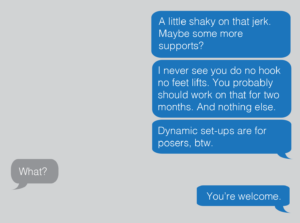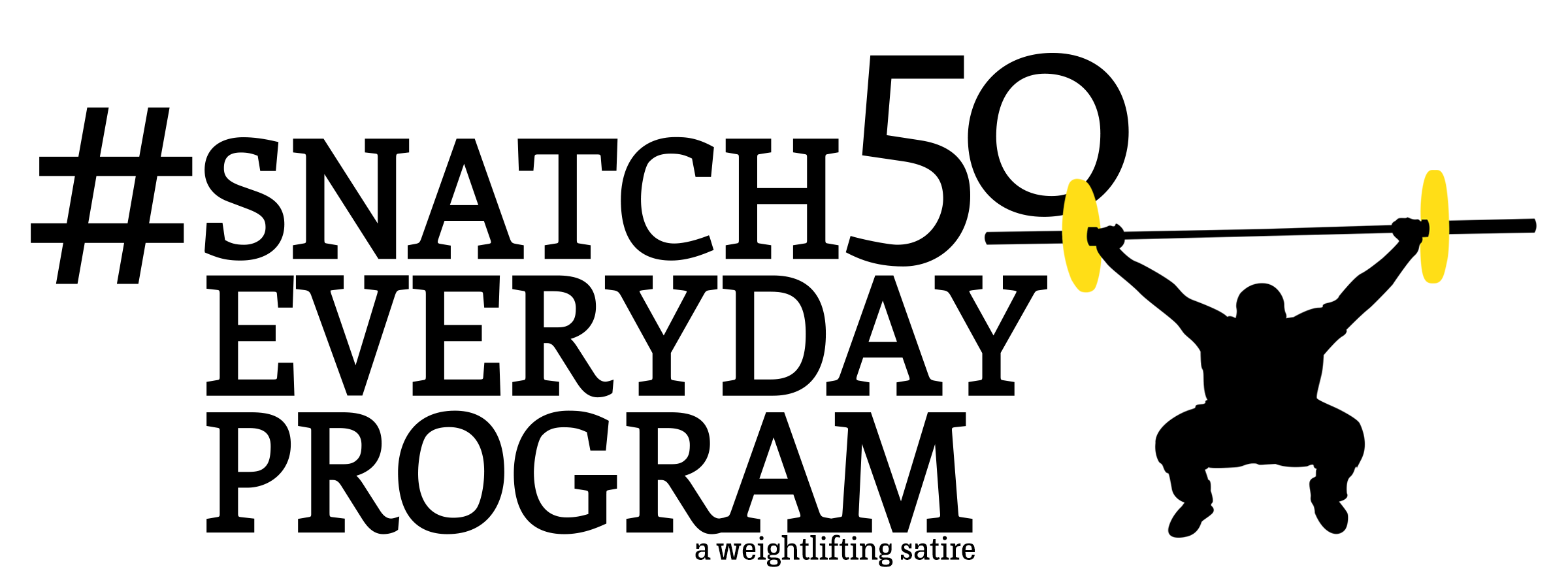Everyone has an opinion but not everyone’s needs to be heard. So thank goodness for a platform like the internet where there is never a drought of ideas poured out by bloggers, self-proclaimed experts, and social media rants. We do indeed live in a renaissance of digital media, and the latest and greatest creations in the field of athletics is the internet weightlifting coach.
The internet weightlifting coach is a true pioneer in the sport of weightlifting, an unyielding force of information. He does not limit himself to one athlete, one team, or even one discipline; he is willing to share his wealth of knowledge to anyone willing to listen or not. The world is his athlete, and he has a conviction to spot and note every flaw in every training video on the World Wide Web.
To some degree, we all admire his cunning and await for his wisdom to shed its light on our social media accounts. Many of us aspire to be the internet weightlifting coach of the future, but not all of us know how to reach that level of dedication – to interject expertise on every make, miss, and wobbly elbow training PR.
It’s a difficult road, reader. But not as difficult with the #snatch50everydayprogram on your side. Here I will give you seven simple steps to become the next best internet weightlifting coach.
1. Get informed.
No one should give coaching advice unless they know what they are talking about. That’s why all internet weightlifting coaches are well-versed in the sport of Olympic-style weightlifting. Make sure that you do your research as well. Twenty minutes of Hookgrip videos on Youtube is the bare minimum. Also acceptable is one weightlifting podcast episode (take your pick), or 3 forum threads on T Nation. But don’t just stop there. Some internet weightlifting coaches will go as far as attend a weekend seminar. This sometimes includes, but is certainly not limited to, USA Weightlifting courses. Most internet weightlifting coaches attend that local weightlifter’s two-hour clinic, the one who got third at the local meet last month. As long as it’s on a weekend, it counts.
If you put this much research into your coaching experience, nothing will be able to stop you from spreading your newfound knowledge.
I guess you could also try to lift some, or train and work with some local athletes to gain experience as an actual coach. But that is unnecessary and totally optional.
2. Expand your platform. Make a lot of social media accounts.
As I said before, an internet weightlifting coach cannot be limited to one gym or city. Once you have the necessary skillset, it’s time to create the largest platform you can – on the Internet. Make a social media account anywhere you can. Popular accounts to coach on are YouTube and Instagram, but do not limit yourself to these. Twitter, Facebook, LinkedIn – whatever you can find and setup.
Unlike a weightlifter, as an internet weightlifting coach, you have no need to worry about getting followers. Instead of bringing people to your message, you’ll be focused on getting your message to them. In fact, it’s best to privatize all of your accounts to protect yourself. Once you start correcting the elite, many people will come flocking to your page to check out your many credentials, or to seek your many nuggets of knowledge. A private account will keep yourself from being bombarded by your many future fans.
3. Pick your athlete(s).
Most athletes like to pick their own coaches. This is a luxury that you cannot afford them. You need to let them know what to work on; their current coach is probably not aware of these faults and isn’t making programming to correct these technical flaws.
Probably not.
So pick your athletes. Start from the top and work your way down. You want to make sure you work with established athletes, preferably internationally competitive, but a nationally competitive athlete works too. Obviously, elite athletes need the most coaching; a bad habit can be the difference between gold and 16th place. And you are the experienced coach this athlete doesn’t know he or she needs. So let it be known.
4. Watch a lifting video and find its faults.
There WILL be faults. Do not say otherwise. Your task is to search out the faults. A comment on an Instagram video will do nothing other than better the athlete, so make sure you have something to say. Note any lock-out issue in a snatch or jerk. If the weight crashes on them in the clean, prescribe block work to work on that turnover. Always say the feet should move more. Always.
What if your athlete actually moves pretty well? It’s time to criticize their programming. Did they just clean an unofficial American record? You should let them know that they should have done the jerk too. A double PR with 99% of their one-rep max? Why not a triple? Did they grunt or exhale in the slightest coming out of a clean? Needs more squats. A comeback PR? Tell them they still need to work in those accessories to rehab whatever they hurt.
If you are looking and still having trouble at finding faults, just make sure to use trending words like “faster.” Or “heels.” Or “reach” or “core.”
My go-to is “keep the bar closer.” It’s golden. #instagold
5. Write your comment or post.
Now that you’ve discovered all of your lifter’s faults, it’s time to let them know. Concisely inform them publicly on the social media platform of choice. You want to make sure that you get to the meat of the conversation, so keep it to the point. To be brief, your criticism shouldn’t be much longer than a well-articulated, five-paragraph essay. In comment form of course. If your social media platform limits the number of characters in a comment, just make multiple comments. The people will thank you for that, just as much as I’ve thanked Twitter for doubling their character limit.
Make sure to have an introduction, listing all of your credentials and how many recap videos of Olympic Games you have watched, so they know that you speak from a position of experience. Go into the lifter’s flaws one at a time, so as not to bombard them with too much information. Since this comment will not only benefit the Team USA member, but also the weightlifting community in general, speak to a broad audience. Assume that an inexperienced lifter is reading your comment, so break everything down excessively. It actually is best to assume the lifter is a five-year-old. Talk about the clean rack position as high elbows shooting lasers. Include a “pew pew” sound effect as well. Kids get a kick out of that. Your lifting community will, too.
Conclude with a summation of faults and a prescription for future programming to the athlete. When in doubt of what to say, just prescribe lighter weight to work on technique. Possibly PVC depending on the severity of issues. When you have finished, revel in your amazing post as you hit send. Await anxiously for your athlete to read it. They almost always read instructional comments. And the comments are always well-received.

6. Respond to everyone’s replies.
After you’ve posted a comment to a lifter’s video, your work has just begun. Now you must defend your position from an onslaught of less-informed internet weightlifting coaches, as well as fans who are “supporting” the athlete. Don’t they realize that you’re supporting him just the same?
Where these comments and discussions can go vary greatly, so be prepared. Sometimes, they can turn into casual conversations about training philosophies and methodologies. So in this case, stay civil. But constantly remind everyone about all the national meets you have attended as a spectator, and how you are way more experienced. Also, keep with those trending words. Throw in an “oscillation” every now and then, and you’re set.
Sometimes these conversations will dumb down into a shouting match of name-calling. If this is the case, make sure to be well-versed in some creative third-grade argument tactics. Call them a barrage of names, like a “poopy-head” and “stupid-face.” Save the harsh ones like “snot-rag” for the intense arguments. When all else fails, inform the assailants that you are rubber and they are glue, and whatever they say bounces off of you and sticks to them. Let them know that “I know what you are, but what am I?”
Eventually, they will yield by saying they have better things to do, but know that you just won that debate decidedly.
7. Move on to the next video or athlete.
An internet weightlifting coach’s work is never done. Once the conversation has died down, it’s time to rinse and repeat. Find your next athlete, research faults, articulate yourself, and defend your position.
The thing that separates a good internet weightlifting coach from a great one is dedication. So stick to your guns. Criticize often, criticize repeatedly, and share your message with whoever wants to listen. And then share it with whoever doesn’t want to listen.
You are a wealth of knowledge waiting to be unleashed, and everyone must know. So go out there and prescribe PVC to that record holder, and do so unabashed.
Have a topic you’d like to see covered by the #snatch50everydayprogram? Contact us at caine@snatch50.com and tell us your idea!


rwt04j
t7cpbo